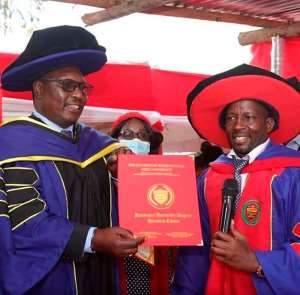
Over the last decade, Ghana's academic landscape has witnessed a troubling trend: the proliferation of PhD degrees from theological schools that demand little to no substantial academic work or research. These easily obtained degrees threaten to undermine the value and rigor traditionally associated with doctoral education, trivializing the attainment of a PhD. A few weeks ago, there was a very sensitive discussion about the worth of a PhD attained in Ghana in comparison to a Dutch passport. The divergent opinions revealed that Ghanaians are consequently placing little value on PhDs.
There has been a surge of questionable theological PhDs and a lot of pastors parading themselves as PhD holders. Some, within a short period, could attain four or more PhDs, moving around gallantly with titles such as Dr. Dr. Dr. Dr. Prof. Makosa. Some cannot even communicate in English, the same language that was used in the method of instruction for the said PhDs. These theological schools, often operating without the stringent academic standards of accredited universities, have increasingly become factories for easily obtainable PhD degrees. These institutions typically offer programs with weak admission criteria, minimal coursework, and negligible requirements for original research. Some even award PhDs based solely on life experience (Honorary PhDs) or casual participation in seminars. Consequently, individuals can acquire these advanced degrees without the rigorous study and intellectual contribution that a legitimate PhD demands.
If this trend is not checked, it will have negative implications on Ghana's academic reputation. As of now, there is a devaluation of doctoral degrees. The ease of obtaining these theological PhDs has led to a widespread perception that doctoral degrees are less valuable. When individuals with minimal academic effort can claim the same title as those who have dedicated years to in-depth research and scholarship, the distinction between genuine academic achievement and superficial credentials becomes foggy. This devaluation will affect the reputation of all PhDs, diminishing the respect and recognition deserved by those who have earned their degrees through rigorous intellectual pursuit.
The prevalence of unearned PhDs is going to put a lot of pressure on our traditional universities to lower their standards to remain competitive in the long term, thereby eroding our academic standards. If obtaining a PhD is perceived as easy, universities may feel less incentive to maintain high academic standards and rigorous research requirements. This will affect the quality of higher education, impacting not only doctoral programs but all levels of academic pursuit. There will be little or no motivation for the younger ones to aspire for higher education.
Moreover, in professional fields, where advanced degrees are seen as indicators of expertise and competence, the dip in the integrity of these qualifications becomes questionable. The overall trust in academic and professional credentials is undermined.
Professional and intellectual development could be significantly diminished. Employers and policymakers may begin to question the validity of academic qualifications as a whole. This will affect hiring practices, with less emphasis placed on academic credentials and more on practical experience or alternative forms of validation.
To curb this, Ghana must intentionally implement robust accreditation processes and stricter oversight of educational institutions to ensure that only those meeting high academic standards are authorized to confer doctoral degrees.
I hope similar articles are published to raise awareness about the difference between legitimate and dubious PhD programs to help the public, employers, and academic institutions better assess the value of academic credentials. Clear communication about the rigorous process involved in earning a genuine PhD can restore respect for legitimate doctoral degrees. People who have earned their PhDs through legitimate means have to be recognized and celebrated to reinforce the value of true academic work. We must promote academic integrity and protect the value of legitimate educational qualifications. We must also implement legal frameworks that penalize the issuance and use of fraudulent academic credentials to deter the spread of these dubious degrees.
This is no attack on our able pastors who have several "Drs" prefixed to their names. This is a call to correct a trend that will cost us as a nation.
Long Live Mother Ghana,
Dumenu Charles Selorm




 You're an illiterate, illogical; a sane person won't praise Bawumia's 'destructi...
You're an illiterate, illogical; a sane person won't praise Bawumia's 'destructi...
 NHIS was a brainchild of NDC, piloted during PNDC era; we've failed to market th...
NHIS was a brainchild of NDC, piloted during PNDC era; we've failed to market th...
 'Mahama has no respect for Ghanaians; I'm disappointed in him' — Development Eco...
'Mahama has no respect for Ghanaians; I'm disappointed in him' — Development Eco...
 King Oyanka petitions IGP: Greater Accra Regional Police accused of undermining ...
King Oyanka petitions IGP: Greater Accra Regional Police accused of undermining ...
 'It's backed by data' — Local gov't Minister clarifies his 'Ghana's poverty leve...
'It's backed by data' — Local gov't Minister clarifies his 'Ghana's poverty leve...
 TUC condemns manager for assaulting female employee at Nkawkaw over GHC90
TUC condemns manager for assaulting female employee at Nkawkaw over GHC90
 SSNIT Hotels Sale: We will continue to engage stakeholders — Director-General
SSNIT Hotels Sale: We will continue to engage stakeholders — Director-General
 Claims gov't secured debt restructuring agreement with IPPs misleading, deceptiv...
Claims gov't secured debt restructuring agreement with IPPs misleading, deceptiv...
 Koforidua SECTECH Staff dies in car crash at Somanya
Koforidua SECTECH Staff dies in car crash at Somanya
 NDC National Executive fume over suspension of ‘sexy’ Assin Central PC
NDC National Executive fume over suspension of ‘sexy’ Assin Central PC
